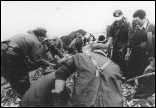|
|
|
|
Production Company: Seirinsha Planning: Matsuhashi Yuzo Producer: Yamagami Tetsujiro Director: Tsuchimoto Noriaki Photography: Shimizu Yoshio Under Water Photography: Higuchi Shiro Sound: Okamoto Koji Sound Design: Takahashi Yuji Transcription of the Music: Murayama Michinori Narrator: Ito Soichi Negative Editing: Shimizu Chieko 1984 / Color / 16mm / 103 min |
| For many years, Tsuchimoto Noriaki commuted to Minamata to produce the Minamata series. After producing an experimental short film called Nuclear Power Scrapbook ("Genpatsu kirinukicho," 1982) based on newspaper clips about nuclear energy, Tsuchimoto began to focus in on the nuclear energy issue as his main theme. The film takes place in Shimokita Peninsula on the northern edge of the mainland, far away from Minamata in southern Kyushu. Shimokita was becoming a "nuclear energy peninsula," undergoing tremendous development and serving as the home port for Mutsu, a nuclear-powered ship. Focusing on fishermen, Tsuchimoto and his crew make their subject matter the "robbing of the sea" perpetrated by giant business conglomerates. Tsuchimoto used the perspective of the fishermen's perceptions of the "ocean" extensively in the Minamata series. While the fishermen of Minamata are obviously victims however, the fishermen in Shimokita Peninsula are still in the process of becoming semi-permanent victims. Hamasekine in 1981. Tsuchimoto conducts careful interviews of the fishermen, a one-man stage play actor and his boat-owner family, elucidating their perceptions of the ocean. Through these interviews, this film shows how the Science and Technology Agency, the Japan Nuclear Ship Research and Development Agency, and the Aomori Prefectural Government gradually steal the sea from the fishermen to turn it into a training site for the US military and the Japanese Self Defense Forces, in the name of development. The opponents of the "theft" failed in the face of an effort to divide the fishing community and at an extraordinary general meeting to sell fishing rights, and in the end, the construction of a new home port for Mutsu went forward. In the last half of the film, Tsuchimoto uses aerial photography to capture the whole of Shimokita Peninsula as it is transformed into a "plutonium peninsula" . |

